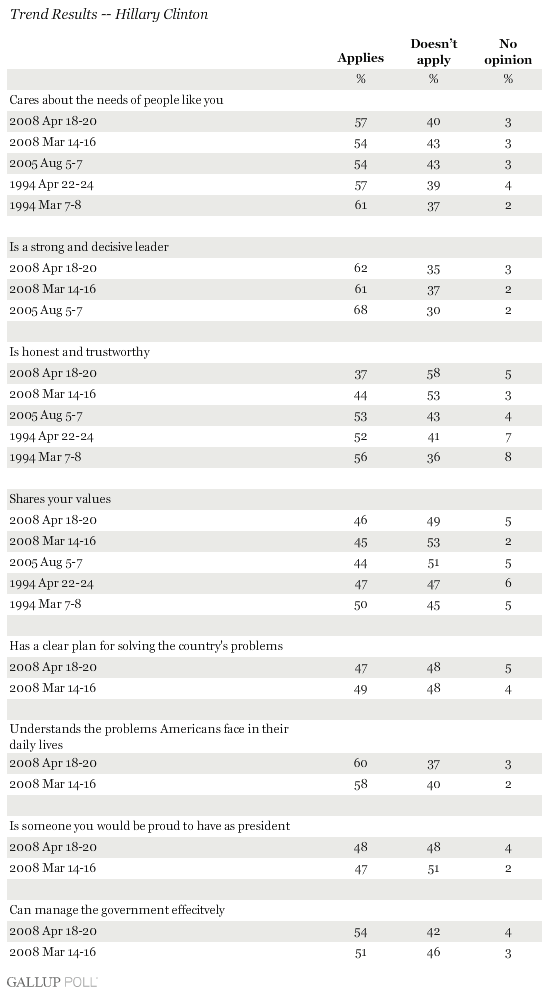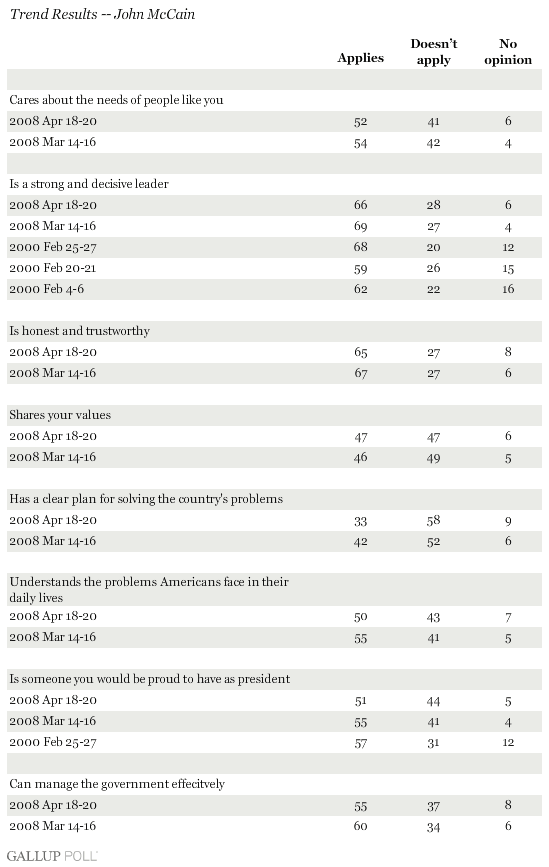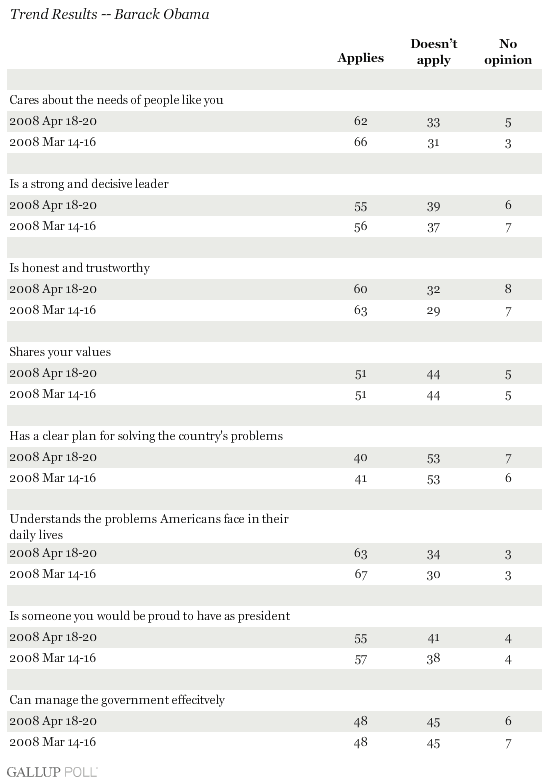PRINCETON, NJ -- The latest USA Today/║┌┴╧═Ї update on the presidential candidates' personal characteristics finds a significant decline since March in the percentage of Americans who believe John McCain "has a clear plan for solving the country's problems." Only 33% currently say this, compared with 42% in March.
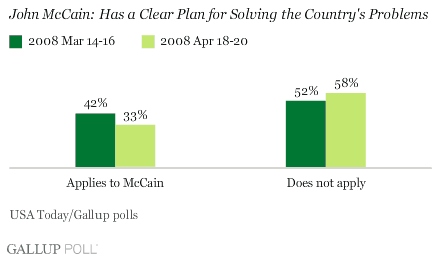
This dimension is clearly a weakness for McCain. It rates as his lowest score among the eight qualities tested in the April 18-20 poll, well behind "shares your values" at 47%. But he also scores significantly worse on the "clear plan" dimension than his Democratic presidential rivals Hillary Clinton (47%) and Barack Obama (40%).
McCain may score lower on the "clear plan" dimension given his admitted weaknesses on economic matters, which Americans regard as the most important problem facing the country. In recent weeks, McCain has attempted to bolster his economic credentials by unveiling his economic plan, and revising his earlier plans for helping distressed homeowners.
McCain's strengths lie in perceptions of his leadership (66% describe him as a "strong and decisive leader") and honesty (65% say he is "honest and trustworthy").
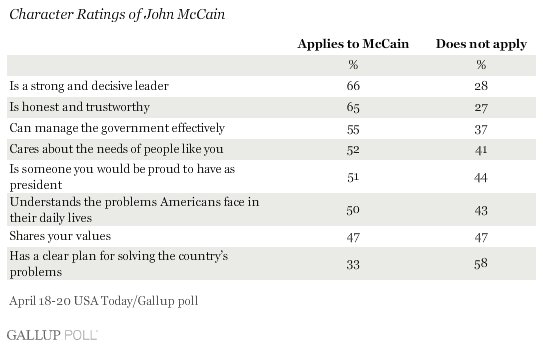
In addition to the nine-point drop on the "clear plan" dimension, McCain's ratings on managing the government effectively and understanding the problems people face in their daily lives have both dropped five points since March.
The April poll also finds a decline in perceptions that Clinton is honest, with only 37% describing her in those terms, down from 44% in March. As recently as 2005, a majority of Americans thought Clinton was honest and trustworthy.
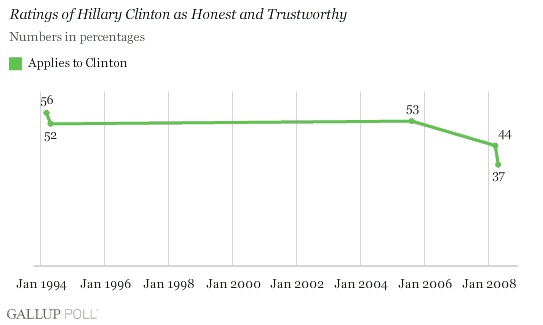
On the honesty dimension, Clinton now ranks even further behind Obama and McCain, both of whose ratings are in the 60% range.
Honesty was the only one of the eight dimensions that showed significant movement for Clinton in the past month, though the poll was conducted before her impressive Pennsylvania primary victory, so it is unclear whether any of these perceptions would have changed in the meantime. The poll finds that leadership, understanding the problems Americans face, and caring about people's needs rank as Clinton's strongest qualities in the eyes of the public.
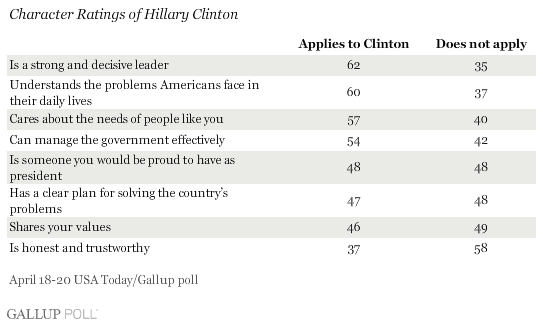
Obama's comments about "bitter" voters sparked media discussion about whether he is an elitist. But his comments did not seem to affect Americans' view that he is a compassionate person, with 6 in 10 Americans saying that he both "understands the problems Americans face in their daily lives" and "cares about the needs of people like you."
Those were his strongest qualities before the comments, and they remain so after, though at slightly lower levels (each declined four points from the March poll).
Aside from those relatively small declines, ratings of Obama on the character dimensions are largely unchanged from March. He is widely viewed as being honest and trustworthy (60%), but like McCain has an apparent weakness in terms of having a clear plan for solving the country's problems.
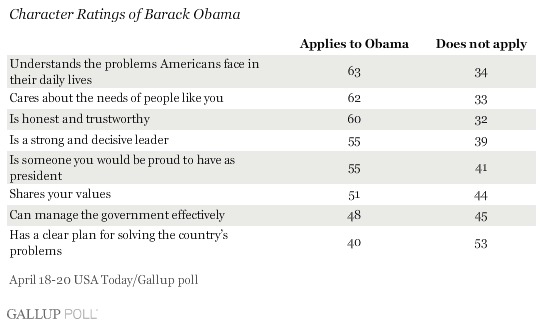
Implications
Clinton and McCain each have obvious weaknesses in the public's eyes at this point, honesty being Clinton's and having a clear plan McCain's. Clinton need only look to her husband for an example of a candidate who won the presidential election despite not being viewed as honest. And while McCain trails the other candidates in terms of being viewed as having a clear plan, none of the three score particularly well on that dimension.
That is not to say character weaknesses do not matter. Ultimately, voters will elect the candidate who best fits what they are looking for in the next president, and character evaluations clearly enter into that equation.
Survey Methods
Results are based on telephone interviews with 1,016 national adults, aged 18 and older, conducted April 18-20, 2008. For results based on the total sample of national adults, one can say with 95% confidence that the maximum margin of sampling error is ┬▒3 percentage points.
Interviews are conducted with respondents on land-line telephones (for respondents with a land-line telephone) and cellular phones (for respondents who are cell-phone only).
In addition to sampling error, question wording and practical difficulties in conducting surveys can introduce error or bias into the findings of public opinion polls.
To provide feedback or suggestions about how to improve ║┌┴╧═Ї.com, please e-mail feedback@gallup.com.
